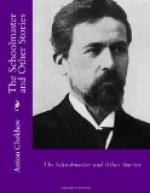But the prisoner, who had been got ready beforehand, was already walking to his bench. He was a tall, thick-set peasant of about fifty-five, completely bald, with an apathetic, hairy face and a big red beard. He was followed by a frail-looking little soldier with a gun.
Just as he was reaching the bench the escort had a trifling mishap. He stumbled and dropped the gun out of his hands, but caught it at once before it touched the ground, knocking his knee violently against the butt end as he did so. A faint laugh was audible in the audience. Either from the pain or perhaps from shame at his awkwardness the soldier flushed a dark red.
After the customary questions to the prisoner, the shuffling of the jury, the calling over and swearing in of the witnesses, the reading of the charge began. The narrow-chested, pale-faced secretary, far too thin for his uniform, and with sticking plaster on his check, read it in a low, thick bass, rapidly like a sacristan, without raising or dropping his voice, as though afraid of exerting his lungs; he was seconded by the ventilation wheel whirring indefatigably behind the judge’s table, and the result was a sound that gave a drowsy, narcotic character to the stillness of the hall.
The president, a short-sighted man, not old but with an extremely exhausted face, sat in his armchair without stirring and held his open hand near his brow as though screening his eyes from the sun. To the droning of the ventilation wheel and the secretary he meditated. When the secretary paused for an instant to take breath on beginning a new page, he suddenly started and looked round at the court with lustreless eyes, then bent down to the ear of the judge next to him and asked with a sigh:
“Are you putting up at Demyanov’s, Matvey Petrovitch?”
“Yes, at Demyanov’s,” answered the other, starting too.
“Next time I shall probably put up there too. It’s really impossible to put up at Tipyakov’s! There’s noise and uproar all night! Knocking, coughing, children crying. . . . It’s impossible!”
The assistant prosecutor, a fat, well-nourished, dark man with gold spectacles, with a handsome, well-groomed beard, sat motionless as a statue, with his cheek propped on his fist, reading Byron’s “Cain.” His eyes were full of eager attention and his eyebrows rose higher and higher with wonder. . . . From time to time he dropped back in his chair, gazed without interest straight before him for a minute, and then buried himself in his reading again. The council for the defence moved the blunt end of his pencil about the table and mused with his head on one side. . . . His youthful face expressed nothing but the frigid, immovable boredom which is commonly seen on the face of schoolboys and men on duty who are forced from day to day to sit in the same place, to see the same faces, the same walls. He felt no excitement about the speech he was to make, and indeed




